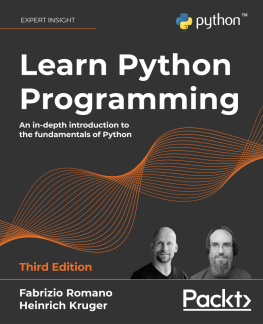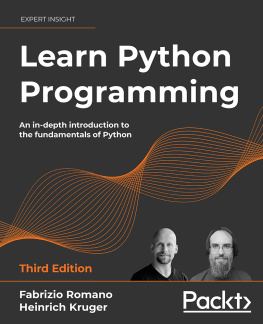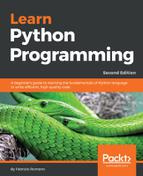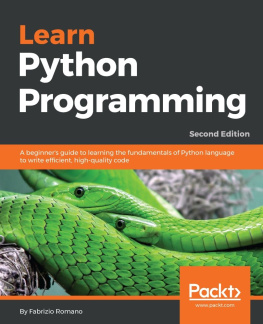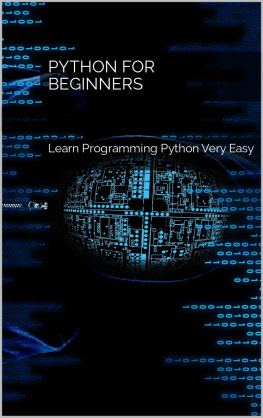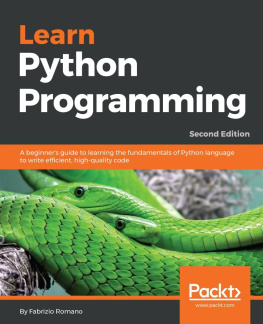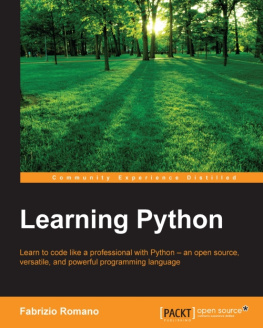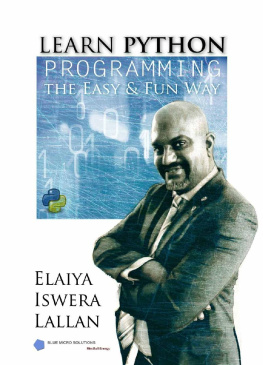Fabrizio Romano - Learn Python Programming, Third edition
Here you can read online Fabrizio Romano - Learn Python Programming, Third edition full text of the book (entire story) in english for free. Download pdf and epub, get meaning, cover and reviews about this ebook. year: 2021, publisher: Packt, genre: Computer. Description of the work, (preface) as well as reviews are available. Best literature library LitArk.com created for fans of good reading and offers a wide selection of genres:
Romance novel
Science fiction
Adventure
Detective
Science
History
Home and family
Prose
Art
Politics
Computer
Non-fiction
Religion
Business
Children
Humor
Choose a favorite category and find really read worthwhile books. Enjoy immersion in the world of imagination, feel the emotions of the characters or learn something new for yourself, make an fascinating discovery.
- Book:Learn Python Programming, Third edition
- Author:
- Publisher:Packt
- Genre:
- Year:2021
- Rating:5 / 5
- Favourites:Add to favourites
- Your mark:
- 100
- 1
- 2
- 3
- 4
- 5
Learn Python Programming, Third edition: summary, description and annotation
We offer to read an annotation, description, summary or preface (depends on what the author of the book "Learn Python Programming, Third edition" wrote himself). If you haven't found the necessary information about the book — write in the comments, we will try to find it.
Learn Python Programming, Third edition — read online for free the complete book (whole text) full work
Below is the text of the book, divided by pages. System saving the place of the last page read, allows you to conveniently read the book "Learn Python Programming, Third edition" online for free, without having to search again every time where you left off. Put a bookmark, and you can go to the page where you finished reading at any time.
Font size:
Interval:
Bookmark:

Learn Python Programming
Third Edition
An in-depth introduction to the fundamentals of Python
Fabrizio Romano
Heinrich Kruger

BIRMINGHAMMUMBAI
"Python" and the Python Logo are trademarks of the Python Software Foundation.
Learn Python Programming
Third Edition
Copyright 2021 Packt Publishing
All rights reserved. No part of this book may be reproduced, stored in a retrieval system, or transmitted in any form or by any means, without the prior written permission of the publisher, except in the case of brief quotations embedded in critical articles or reviews.
Every effort has been made in the preparation of this book to ensure the accuracy of the information presented. However, the information contained in this book is sold without warranty, either express or implied. Neither the authors, nor Packt Publishing or its dealers and distributors, will be held liable for any damages caused or alleged to have been caused directly or indirectly by this book.
Packt Publishing has endeavored to provide trademark information about all of the companies and products mentioned in this book by the appropriate use of capitals. However, Packt Publishing cannot guarantee the accuracy of this information.
Producer: Tushar Gupta
Acquisition Editor Peer Reviews: Suresh Jain, Saby Dsilva
Project Editor: Namrata Katare
Development Editor: Lucy Wan
Copy Editor: Safis Editing
Technical Editor: Aditya Sawant
Proofreader: Safis Editing
Indexer: Tejal Daruwale Soni
Presentation Designer: Pranit Padwal
First published: December 2015
Second edition: June 2018
Third edition: October 2021
Production reference: 2081221
Published by Packt Publishing Ltd.
Livery Place
35 Livery Street
Birmingham
B3 2PB, UK.
ISBN 978-1-80181-509-3
www.packt.com
"To Elisa, the love of my lives, and to all those who gift the world their beautiful smiles."
Fabrizio Romano
"To my wife, Debi, without whose love, support, and endless patience I would not have been able to do this."
Heinrich Kruger
Fabrizio Romano was born in Italy in 1975. He holds a master's degree in Computer Science Engineering from the University of Padova. He's been working as a professional software developer since 1999. Fabrizio has been part of Sohonet's Product Team since 2016. In 2020, the Television Academy honored them with an Emmy Award in Engineering Development for advancing remote collaboration.
I would like to thank everyone at Packt, and the reviewers, who helped us in making this book a success. I also want to thank Heinrich Kruger and Tom Viner for joining me in this adventure. My deepest gratitude goes to my wife-to-be, Elisa, who never made me feel like I was neglecting her, even though I was. Thank you for your love and support.
Heinrich Kruger was born in South Africa in 1981. He holds a master's degree in Computer Science from Utrecht University in the Netherlands. He has been working as a professional software developer since 2014 and has worked alongside Fabrizio in the Product Team at Sohonet since 2017.
I want to thank Fabrizio for asking me to help him with this book. It's been a great experience working with you, my friend. I would also like to thank Tom Viner and Dong-hee Na for their helpful comments, as well as everyone at Packt who helped us along the way. Most of all, I thank my wife, Debi, for all her love, encouragement, and support.
Tom Viner is a principal software developer living in London. He has over 13 years' experience in building web applications and has been using Python and Django for 10 years. He has special interests in open-source software, web security, and test-driven development.
I would like to thank Fabrizio Romano and Heinrich Kruger for inviting me to review this book.
Dong-hee Na is a software engineer and an open-source enthusiast. He works at Line Corporation as a backend engineer. He has professional experience in machine learning projects based on Python and C++. As for his open-source work, he focuses on the compiler and interpreter area, especially for Python-related projects. He has been a CPython core developer since 2020.
The first edition of this book came out on the day of my 40th birthday. It feels like yesterday, but actually it was 6 years ago. In a few weeks, the book became a top seller, and to this day that translates into lovely messages and emails I get from readers all over the world.
A couple of years later, I wrote a second edition. That turned out to be a better book, which kept growing in sales and popularity.
And now here we are, at the third edition, and this time it won't just be me narrating the story, because for this edition I have been joined by my dear friend and colleague, Heinrich Kruger.
Together, we have reworked the book's structure. We removed what we felt didn't fit anymore, and added what we thought would benefit you the most. We have shuffled things around, amended old chapters, and written new ones. We have made sure that both our contributions and our best ideas are on each page you will read. We are both very happy about this.
I always wanted to work on a project like this with Heinrich, for whom I have felt enormous respect since I got to know him. He has brought to this book his unique perspective, his incredible talent as a software developer, and he's helped me with my English too!
Everything has been updated to Python 3.9, but of course most of the code will still work with any recent version of Python 3. The scary chapter about concurrency is gone, and the one on Web programming has been replaced with another which introduces the concept of APIs. We have also added a whole new chapter about packaging Python applications, which we feel is the perfect way to close the book.
We are confident this edition is much better than the previous ones; it's more mature, it tells a better story, and it will take you places.
One thing I am particularly happy about is that the soul of the book is still the same. This is not just a book about Python. This is, first and foremost, a book about programming. A book that aims to convey to you as much information as possible, and sometimes, for practical reasons, it does so by pointing you to the Web to dig deeper, to investigate further.
It is designed to last. It expresses concepts and information in a way that should stand the test of time, for as long as possible. We have put in a great amount of thinking to achieve that.
And it will require you to work hard. The code is available for you to download, and we do encourage you to play with it, expand it, change it, break it, and see things for yourself. We want you to develop critical thinking. We want you to be independent, empowered.
That is the soul of the book, and our hope is that wherever you are in your journey, it will help you go further, become a better programmer, in any way that is possible.
When we received the drafts from the second edition to start working on the third one, I was surprised to notice I could not find myself in those pages. Those pages have shown me how my thinking, and therefore my writing, has changed, in the past few years.
Font size:
Interval:
Bookmark:
Similar books «Learn Python Programming, Third edition»
Look at similar books to Learn Python Programming, Third edition. We have selected literature similar in name and meaning in the hope of providing readers with more options to find new, interesting, not yet read works.
Discussion, reviews of the book Learn Python Programming, Third edition and just readers' own opinions. Leave your comments, write what you think about the work, its meaning or the main characters. Specify what exactly you liked and what you didn't like, and why you think so.

